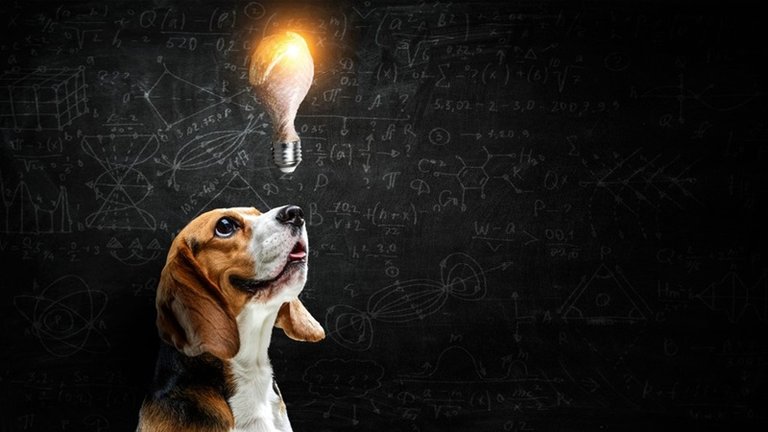
Gone are the days when people coldly believed in the idea that animals were not thinking creatures (at least, I don't know anyone who thinks otherwise), and especially those people who have had pets in their homes certainly must. agree with me. Speaking from experience, I've seen some pets do seemingly unbelievable things, showing how intelligent they can be. *From this point I ask myself: ”Did they do what they did at random (out of the blue), or did they reason to do that activity?”
I don't have the answer. Nobody has. However, believing that they can have their own personalities opens up an interesting debate about animal behavior. In the case of dogs, I see a lot of people trying to mold them into their image and likeness, but all I can really see are animals that do whatever they want whenever they want, because even though they can be trained, they think and act as they wish. This may not be true for all pets, but there is a natural instinct within all of them.

In today's society, the process of “animal domestication” is something that ends up “castrating” the natural behavior of animals, which should be developed within the naturalness of their own actions. Unfortunately, social life requires rules that increasingly encourage training, meaning that pets need to fit into an acceptable standard. On the one hand, this is understandable, but not to the point of taking away their natural instinct and all other characteristics (which end up being replaced by their own guardians' desires for change).
No matter how domestic an animal becomes, it will always be an animal, and as such, they need to have their freedom preserved as much as possible (even if they live outside their original habitats). It is not possible to change what they think, and although they can have their behaviors controlled (not in all cases, of course), they will still always be animals. Trying to create a bridge between humans and pets by focusing on the wrong target (in this case, reprogramming them) will always be reprehensible because animals will always be animals, not humans.
Atrás quedaron los días en que la gente creía fríamente en la idea de que los animales no eran criaturas pensantes (al menos, no conozco a nadie que piense lo contrario), y especialmente aquellas personas que han tenido mascotas en sus hogares ciertamente deben estar de acuerdo conmigo. Hablando por experiencia, he visto a algunas mascotas hacer cosas aparentemente increíbles, demostrando lo inteligentes que pueden ser. A partir de este punto me pregunto: ”¿Hicieron lo que hicieron al azar o razonaron para hacer esa actividad?”
No tengo la respuesta. Nadie lo ha hecho. Sin embargo, creer que pueden tener personalidad propia abre un interesante debate sobre el comportamiento animal. En el caso de los perros, veo mucha gente tratando de moldearlos a su imagen y semejanza, pero lo único que veo realmente son animales que hacen lo que quieren cuando quieren, porque aunque se les puede entrenar, piensan y actuar como quieran. Puede que esto no sea cierto para todas las mascotas, pero existe un instinto natural dentro de todas ellas.
En la sociedad actual, el proceso de “domesticación animal” es algo que termina por “castrar” el comportamiento natural de los animales, el cual debe desarrollarse dentro de la naturalidad de sus propias acciones. Desafortunadamente, la vida social requiere reglas que fomenten cada vez más el adiestramiento, lo que significa que las mascotas deben ajustarse a un estándar aceptable. Por un lado, esto es comprensible, pero no hasta el punto de quitarles el instinto natural y todas las demás características (que acaban siendo sustituidas por los deseos de cambio de sus propios guardianes).
No importa cuán doméstico se vuelva un animal, siempre será un animal y, como tal, necesitan que se preserve su libertad tanto como sea posible (incluso si viven fuera de sus hábitats originales). No es posible cambiar lo que piensan, y aunque se puedan controlar sus comportamientos (no en todos los casos, claro), siempre seguirán siendo animales. Intentar crear un puente entre los humanos y las mascotas centrándose en el objetivo equivocado (en este caso, reprogramándolos) siempre será reprensible porque los animales siempre serán animales, no humanos.
Já se foi o tempo em que as pessoas acreditam friamente na ideia de que os animais não eram criaturas pensantes (ao menos, eu não conheço ninguém que pense o contrário), e principalmente aquelas pessoas que já tiveram animais de estimação em seus lares certamente devem concordar comigo. Falando por experiência própria, eu já vi alguns animais de estimação fazendo coisas aparentemente muito inacreditáveis, mostrando o quão inteligentes eles conseguem ser. A partir desde ponto eu me pergunto: ”Eles fizeram o que fizeram ao acaso, ou raciocinaram para fazer aquela atividade?”
Eu não tenho a resposta. Ninguém tem. No entanto, acreditar que eles possam ter personalidades próprias é algo que abre um debate interessante sobre o comportamento animal. No caso dos cachorros, eu vejo muitas pessoas tentando moldá-los à sua imagem e semelhança, mas tudo que eu realmente consigo ver são animais que fazem tudo o que eles querem quando eles querem, porque ainda que eles possam ser adestrados, eles pensam e agem como eles desejam. Isso pode ser algo que não se aplica a todos os animais de estimação, mas há um instinto natural dentro de todos eles.
Na sociedade atual, o processo de “domesticação animal” é algo que acaba “castrando” o comportamento natural dos animais, que deveriam ser desenvolvidos dentro da naturalidade de suas próprias ações. Infelizmente, o convívio social exige regras que fomentam cada vez o adestramento, fazendo com que os animais de estimação precisem se encaixar dentro de padrão aceitável. Por um lado, isso é compreensível, mas não a ponto de tirar deles o seu instinto natural e todas as demais características (que acabam sendo substituídas pelos desejos de mudança dos seus próprios tutores).
Não importa o quão doméstico um animal consiga se tornar, ele sempre será um animal, e como tal, eles precisam ter à sua liberdade de ser preservada o máximo possível (ainda que vivam fora dos seus habitats originais). Não é possível mudar o que eles pensam, e embora possam ter os seus comportamentos controlados (não em todos os casos, é claro), eles ainda sim serão sempre animais. Tentar criar uma ponte entre humanos e animais de estimação focando no alvo errado (neste caso, reprogramá-los) sempre será algo reprovável porque animais serão sempre animais, não humanos.
Posted Using InLeo Alpha
Your post was manually curated by @Shiftrox.
Delegate your HP to the hive-br.voter account and earn Hive daily!
🔹 Follow our Curation Trail and don't miss voting! 🔹
I like how honest you appeared on this subject.
It's not that I'm against having a pet or training them to behave like humans but come on, there ought to be boundaries 😎
To be honest, I think it's understandable... However, there need to be limits for everything.
Till now, I am still amazed with the type of bond dogs shared with other animals
It's kinda "crazy" sometimes, haha!